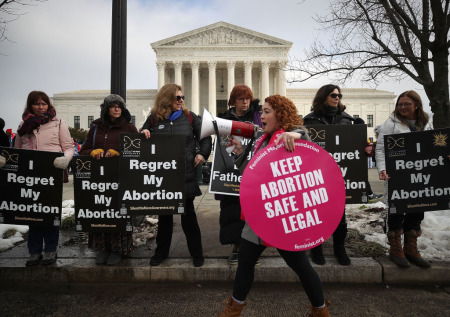Post-abortion depression is 'widespread globally,' study finds

The tendency of women who have had an abortion to experience depression following the procedure is "widespread globally," a recently published study suggests.
BMC Psychiatry, an open access, peer-reviewed journal, published a study late last month by a group of Ethiopian medical researchers led by Natnael Atnafu Gebeyehu and Kirubel Dagnaw Tegegne titled "Global prevalence of post-abortion depression: systematic review and Meta-analysis."
The study, which analyzed 15 papers that had a total of 18,207 research participants based on a total of 657 articles, found that, overall, 34.5% of women who had an abortion experienced depression.
"The prevalence of post-abortion depression varied based on geographic location, World Health Organization (WHO) regions, World Bank income category, screening approach, and study design," explained the researchers.
For example, the largest "proportion of post-abortion depression" was found in Asia at 37.5%. In comparison, "the greatest rate of post-abortion depression" was found in the WHO's Eastern Mediterranean region at 43.1%. Additionally, the greatest frequency of post-abortion depression was found in lower-middle-income countries at 42.91%.
"In conclusion, the occurrence of post-abortion depression has been observed to be widespread globally," continued the study. "Healthcare providers should prioritize the provision of post-abortion counseling, care, and emotional support to women."
In an analysis last week, Dr. Hibah Khaja of Psychiatry Advisor wrote that the recent study findings "indicate that a large proportion of women who have undergone an abortion experience depression."
However, Khaja also warned that "this study may be limited by the variability in depression measurements, absence of data from certain geographic areas, and reliance on self-reported responses."
Randall O'Bannon, the director of education and research for the National Right to Life Committee, wrote in an op-ed that the study "mixed together data about induced abortion with spontaneous abortion or miscarriage."
"Their thesis, valuable in its own right, was that pregnancy loss of any sort was traumatic, whether the abortion was intentional (e.g., chemical or surgical abortion) or not (as in the loss of a wanted child through miscarriage)," O'Bannon wrote. "I knew that this wouldn't settle the critics who claim that post-abortion depression is a myth or at most a temporary, fleeting phenomena experienced by just a handful of women already dealing with some latent psychological disorders."
"But when sorted out, what the studies show is that it was a much lower incidence of grief over a miscarriage that gave an overall lower percentages of women with depression," O'Bannon added. "Studies that focused on abortion tended to show higher rates of depression."
O'Bannon contends that the titles of studies that specifically use the term "post-abortion" or "induced abortion" point to "a rate of depression of at least 22.5% (China, 2021) or as high as 54% (Iran, 2018), averaging out to 31.4% when data is taken as a whole."
"All the data taken from the studies related to miscarriage yield a percentage less than half that, with 15.6% reporting depression after the pregnancy loss," O'Bannon wrote. "It may not be what researchers set out to prove, but their meta-analysis tends to lend support to abortion is much more likely to lead to depression than miscarriage."
The study's conclusion that post-abortion depression is a common side-effect of terminating a pregnancy contrasts with the past conclusions of other research organizations, including the American Psychological Association.
In a report by the APA Task Force on Mental Health and Abortion released in 2008, researchers concluded that "among adult women who have an unplanned pregnancy the relative risk of mental health problems is no greater if they have a single elective first-trimester abortion than if they deliver that pregnancy."
"Across studies, prior mental health emerged as the strongest predictor of postabortion mental health," stated the APA report. "Many of these same factors also predict negative psychological reactions to other types of stressful life events, including childbirth, and, hence, are not uniquely predictive of psychological responses following abortion."
The 2008 APA report noted that "evidence regarding the relative mental health risks associated with multiple abortions is more equivocal."
"Positive associations observed between multiple abortions and poorer mental health may be linked to co-occurring risks that predispose a woman to both multiple unwanted pregnancies and mental health problems," the APA added.






















